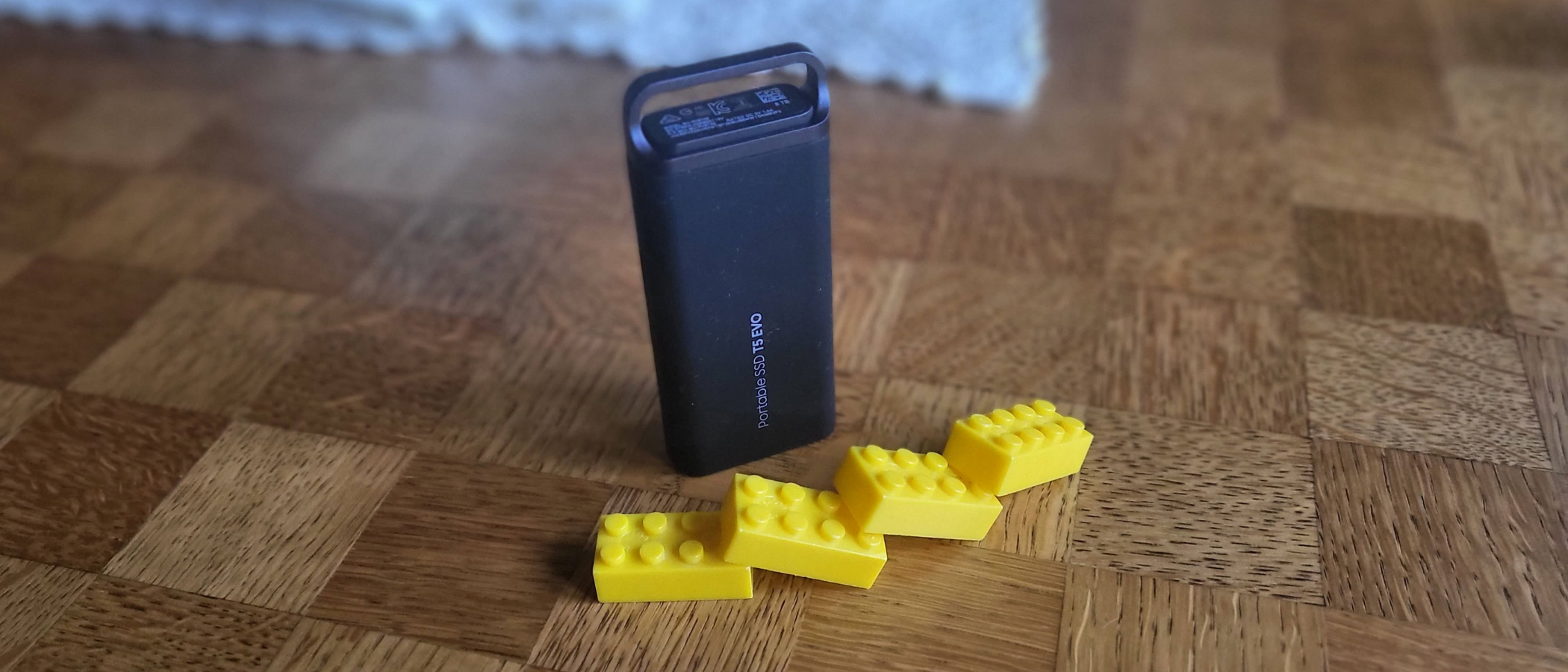TechRadar Verdict
Samsung’s first portable EVO SSD impresses on capacity but disappoints when it comes to sheer value for money and general performance, hitting speeds that I’d consider to be average at best and, for a device with this price tag, frankly very poor.
Pros
- +
Built-in handle
- +
Sturdy
- +
Three-year warranty
Cons
- -
Slow
- -
More expensive than the competition
- -
No IP rating
Why you can trust TechRadar
Samsung T5 Evo: One-minute review
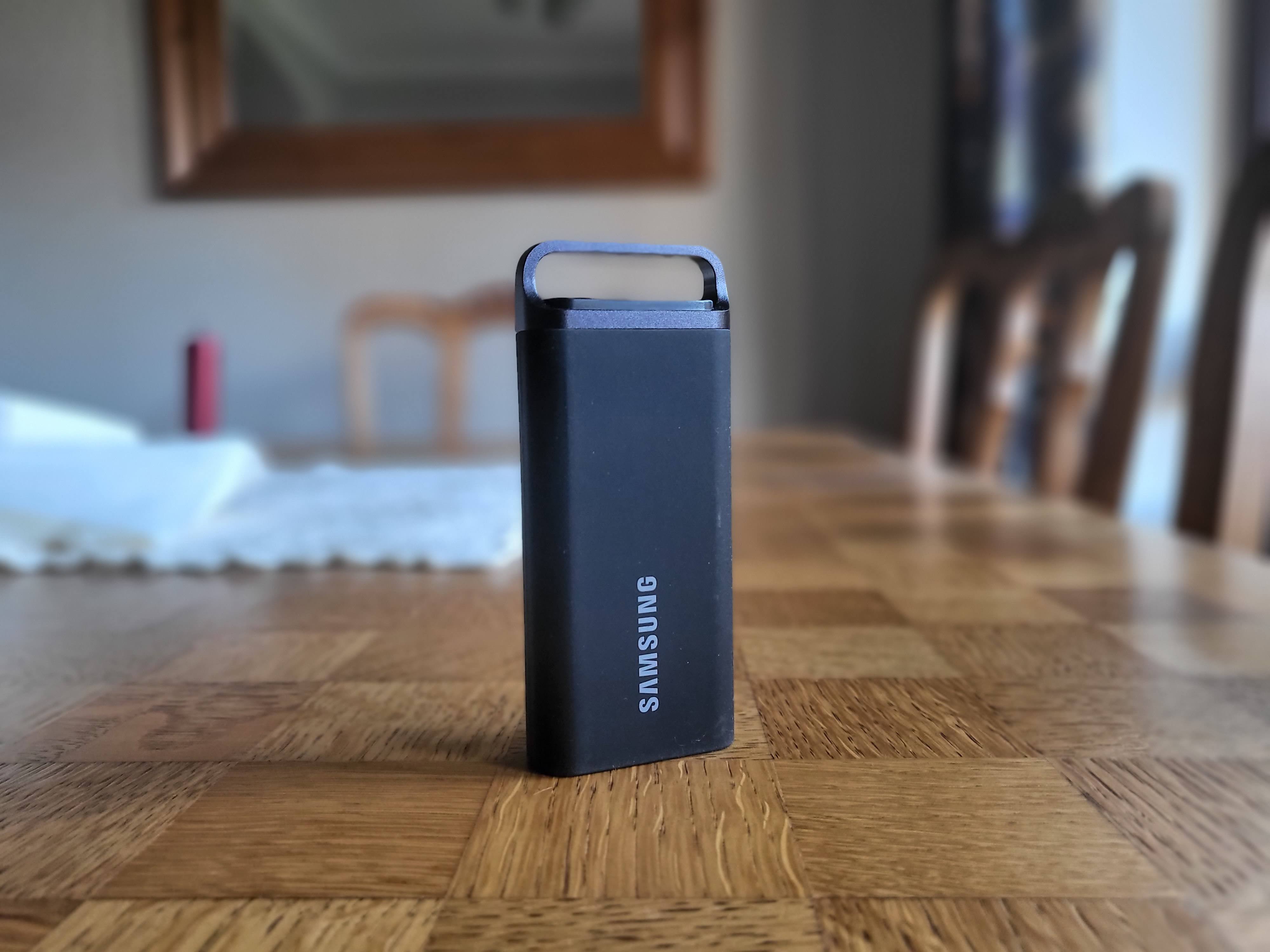
The Samsung T5 Evo 8TB portable SSD is the first of its kind, a storage device that has been designed from ground up to support this capacity - and potentially more in the future. It is very well designed - a clever mix of metal and rubber - especially with the integrated carry handle (Samsung calls it a ring) that makes it instantly likable.
It feels modern compared to its direct competition, eschewing the flat Kit-Kat shape design adopted by other players like Vectotech, Oyen Digital or Glyph, a legacy from the days of 2.5-inch SSDs. I like its long Type-C cable, the Samsung’s Magician SSD management software (with hardware encryption) and its three-year warranty but that’s where the good bit ends. This is a slow portable SSD and is especially poor value at the lower capacities (2TB and 4TB) with Samsung’s own T series, SanDisk and many others delivering far, far better value for money.
And speaking of price, its suggested retail price is shocking to say the least but Samsung has cleverly positioned the 8TB as an external HDD replacement. The marketing literature reads “T5 Evo is an optimal product to replace external HDDs in all aspects, including performance, durability, compatibility, compact design and high capacity”. So, with the 8TB model at least, the T5 Evo delivers just enough value for money in order for the target audience, creative professionals.
Bear in mind as well that it doesn’t carry any IP or MIL-STD ratings; so make sure it doesn't get wet, it is not a water resistant device. While it may not act as the best rugged hard drive, it still feels reasonably solid but be aware of this limitation. It is difficult to recommend the T5 Evo at this price, just under $650, about twice that of the 8TB Samsung 870 QVO (albeit internal) and there are other cheaper alternatives that will perform just as well. As such, the drive won’t enter our best portable SSD buying guide without a significant drop in price.
Samsung T5 Evo: Pricing and availability
- How much does it cost? $650
- When is it available? Now
- Where can you get it? In the US, UK, Australia and other territories
Ultra large capacity SSDs are far and few between because they tend to be far more expensive and the market for such drives is very small compared to smaller capacities (2TB or 4TB).
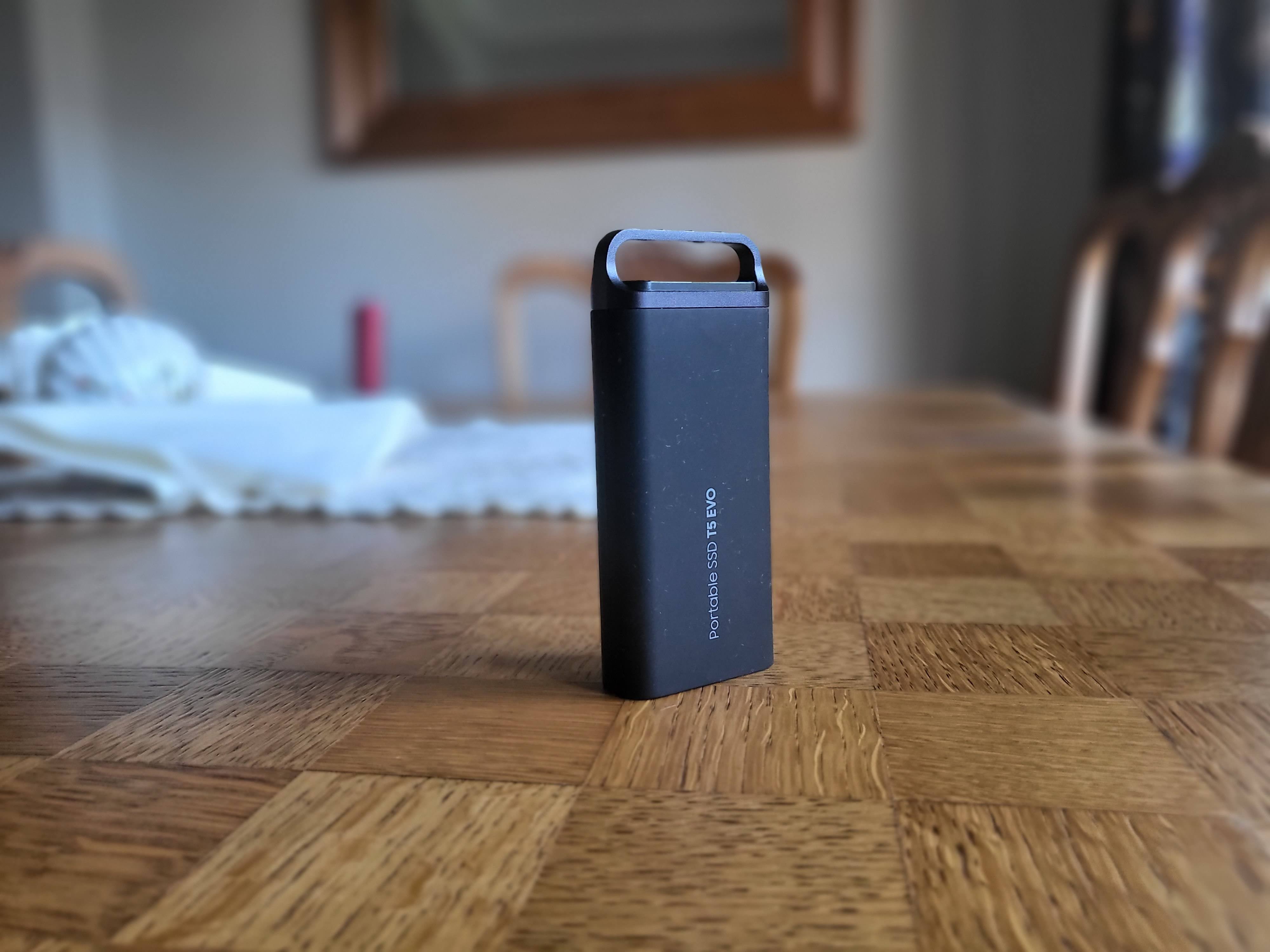
Samsung T5 Evo: Design
The components inside the T5 Evo are housed in a metal enclosure (unibody aluminum) and wrapped in a rubber sleeve. There’s a blue LED indicator and a Type-C port. The portable SSD itself is heavier than expected at 102 grams (0.23 pounds) and far larger as well. At 17mm (0.67 inches) thick and 95mm (3.74 inches) long, I’d find it a bit more difficult to slip in my jeans’ pockets. The package includes a 46cm Type-C to Type-C cable and there’s no adaptors should you want to use it with a traditional Type-A connector.
A tear down carried out by our sister publication, Anandtech, showed that the drive looks like a repackaged 870 QVO, which costs about half the price and uses cheaper QLC NAND chips (as opposed to more expensive but more resilient TLC). Check out the review carried out by another of our peers, Tomshardware.
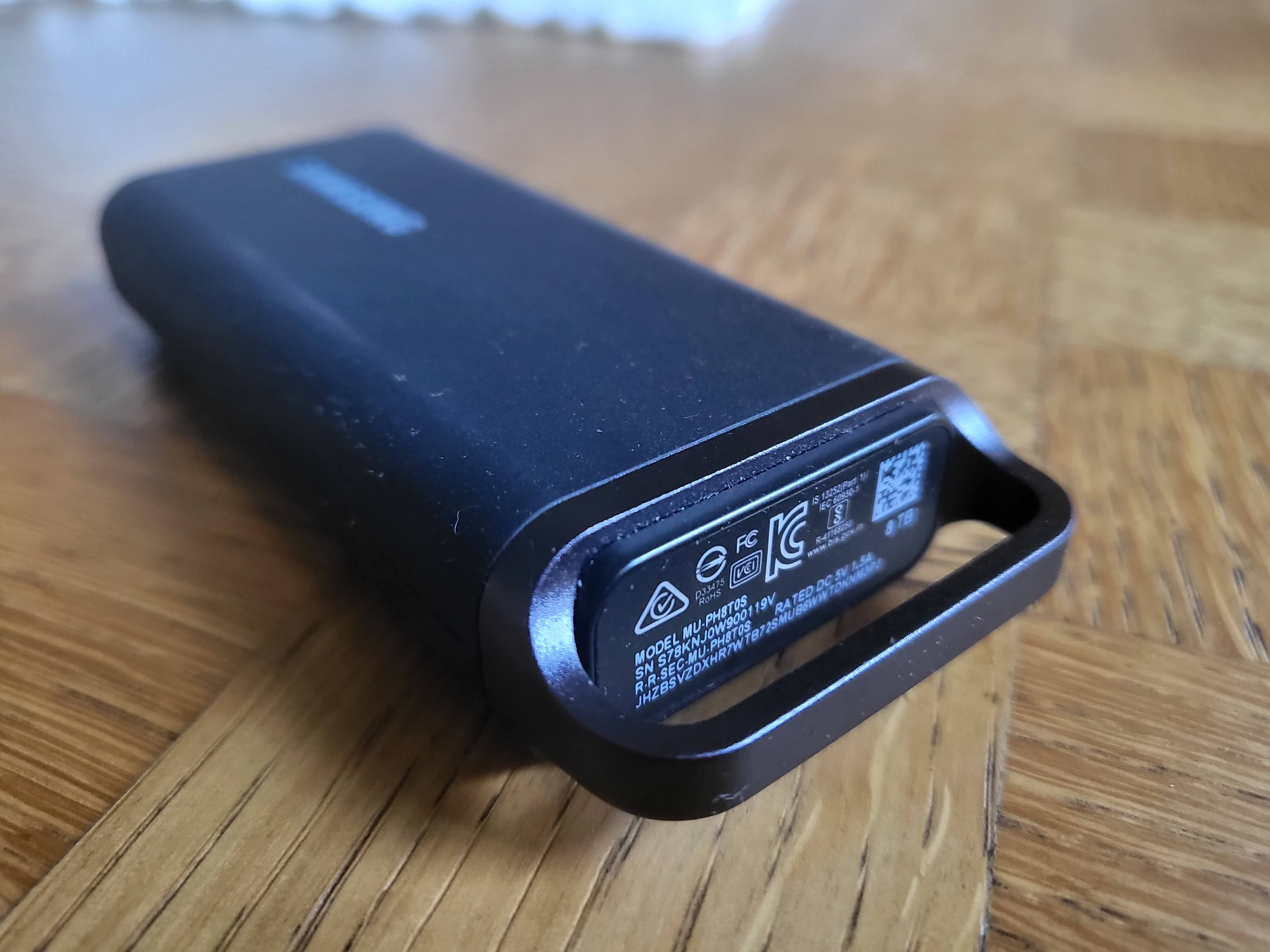
Samsung T5 Evo: Benchmark
The T5 Evo is one of the slowest portable SSD we’ve tested in recent times. It is something Samsung is very open about unlike some of its competitors.
| Row 0 - Cell 0 | Read (MBps) | Write (MBps) |
| AJA | 422 | 405 |
| CrystalDiskMark | 466 | 466 |
| ATTO | 445 | 445 |
| AS SSD | 429 | 429 |
| Real Life | 366 | 366 |
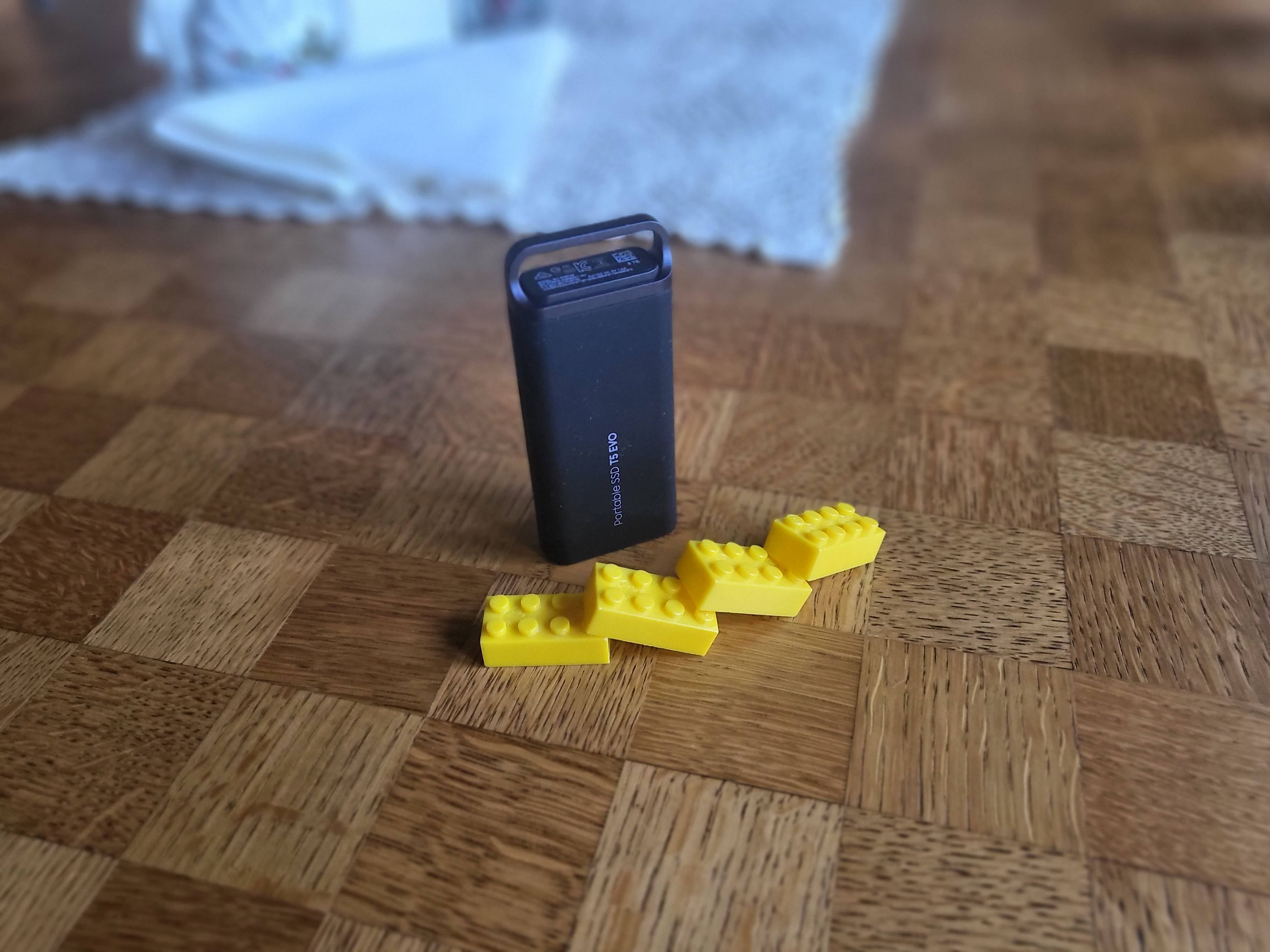
Samsung T5 Evo: Specs
| Row 0 - Cell 0 | Row 0 - Cell 1 |
| Capacities available | 2TB, 4TB, 8TB |
| Size | 95 x 40 x 17mm |
| Weight | 102g |
| Enclosure material | Rubber |
| Connector | USB-C |
| Technology | USB 3.2 Gen 1 |
| Warranty (in years) | 3 |
| Rated R/W speeds (MBps) | 460/460 |
| Software bundle | No |
Should I buy the Samsung Portable SSD T5 Evo?
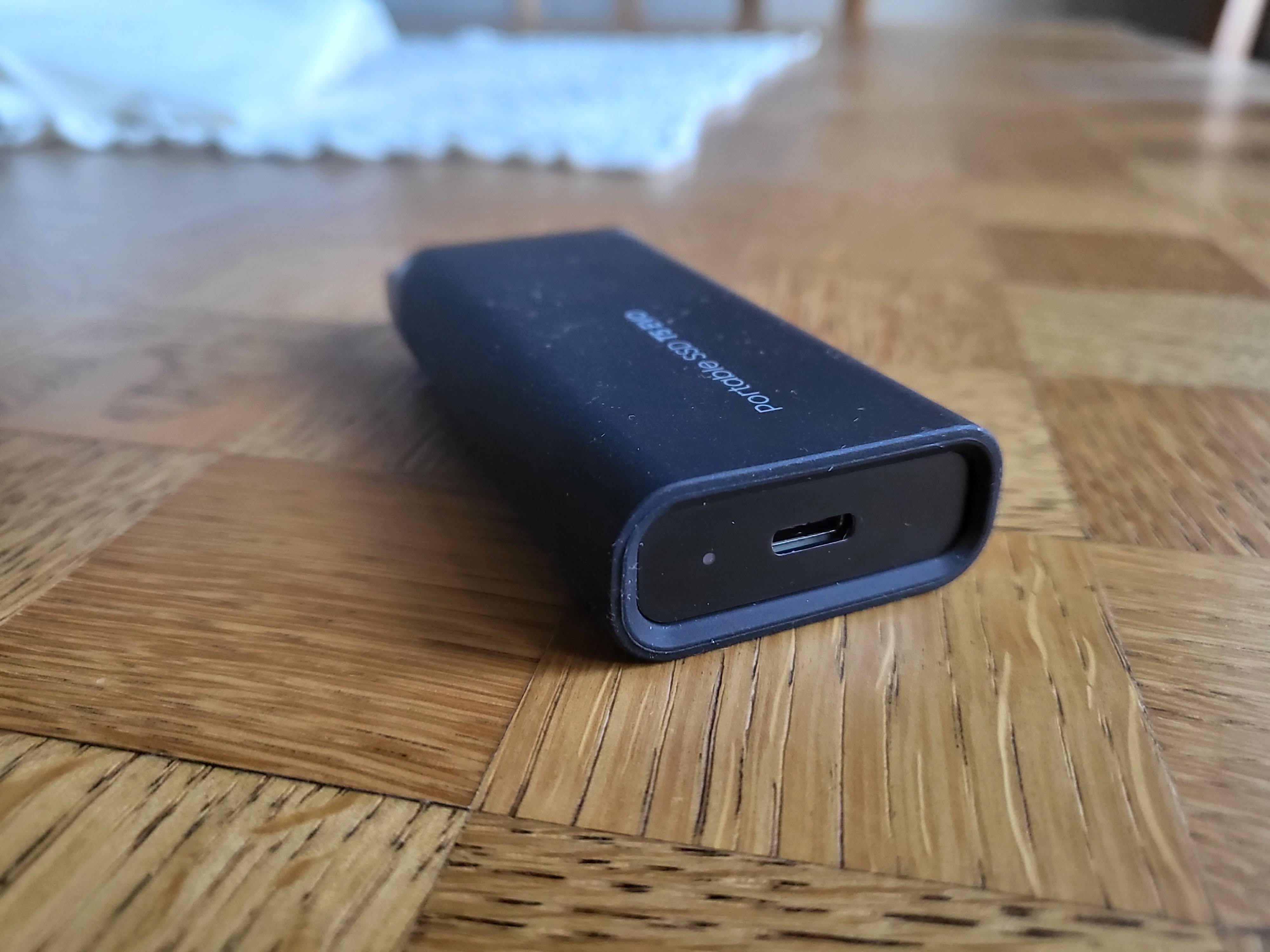
Buy it if...
You want peace of mind associated with a big brand
Yes, there are other brands that sell a ready-to-go 8TB portable SSD but Samsung is a globally recognized household name and the other three aren’t. Who would you trust with 8TB worth of content?
You want a hassle-free 8TB portable SSD
The easiest way to get an 8TB external SSD is to go down the DIY way; Grab a Samsung 870 EVO and plug it into an external enclosure, even better, grab two and use a dual 2.5-inch SATA RAID enclosure to score 16TB storage for not much more than what the T5 Evo costs. But not everyone wants to do that and for that particular segment of the audience, there’s the T5 Evo.
Don't buy it...
You want a true rugged portable SSD
The Samsung Portable SSD T5 Evo is not a rugged external SSD although its design made us feel this way. Its own warranty doesn’t cover damage caused by drop and it doesn’t come with an IP-rating. Ouch!
You want a fast rugged portable SSD
To make the most out of the USB 3.2 Gen 2x2 performance, you will need to have a compatible laptop or desktop, which is rarer than you think. Otherwise, you will be missing out on one of the main reasons to buy the ZX20.
You want the cheapest large capacity external SSD
The Samsung Portable SSD T5 Evo is about a third more expensive than its cheapest competitor, which has the added advantage of having an IP-rating and an extra Type-C/Type-A cable.
Samsung Portable SSD T5 Evo alternatives
| Row 0 - Cell 0 | Oyen Digital U32 | Vectotech | Titanium One |
| Capacity | 8TB | 8TB | 8TB |
| Price | $509 | $539 | $480 |
| Speed | 540MB/s | 540MB/s | 450MB/s |
| IP rated | No | No | Yes |
| Warranty (yrs) | 3 | 3 | 3 |
There are at least three other 8TB SSD, widely available on the market - the Oyen Digital U32, Vectotech, and Titanium One - all being cheaper than Samsung’s T5 Evo. The Titanium One is the one we’d go for since it comes with an IP rating. If you need a faster SSD, you can either build one yourself (using a compatible NVMe enclosure and an off-the-shelf SSD) or go for a PCIe-based model that will cost you nearer to $1,000.

How I tested the Samsung Portable SSD T5 Evo
After having formatted the T5 Evo to exFAT, I test it the same way I test other storage components (external HDD, microSD cards etc) using my trusty Honor Magicbook 14 2022. I use the latest versions of CrystalDiskMark, Atto, AS SSD and AJA benchmarks, noting the best scores achieved in each. They are all free and can be downloaded by anyone. I then transfer a folder of files, roughly 10GB in size, to get a rough idea of real life performance.

Désiré has been musing and writing about technology during a career spanning four decades. He dabbled in website builders and web hosting when DHTML and frames were in vogue and started narrating about the impact of technology on society just before the start of the Y2K hysteria at the turn of the last millennium.
